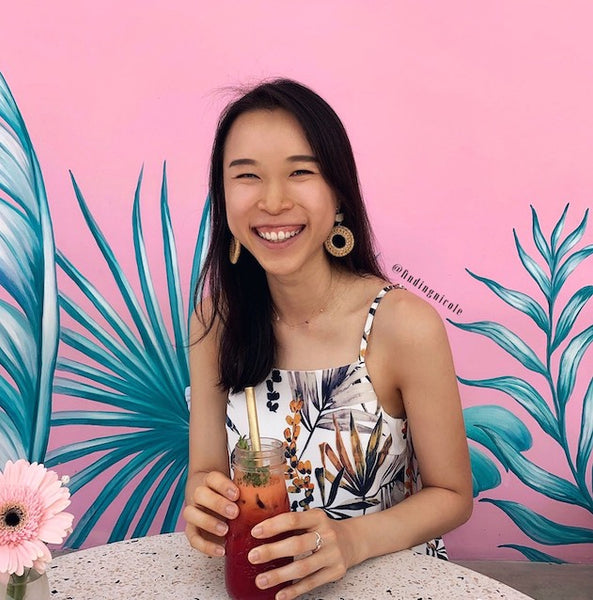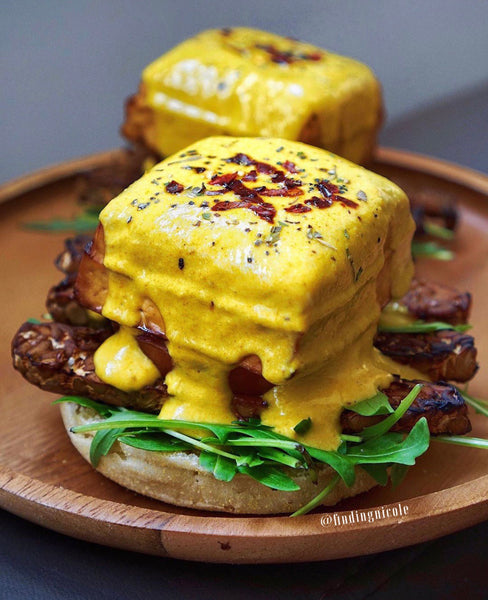Why Plant-based? Personal Story & First-hand Tips by a 3-Year-Vegan
"By cutting out meat and dairy, global farmland use could be reduced by more than 75% – an area equivalent to the US, China, European Union and Australia combined – and still feed the world."
In light of the horrible Amazon forest fires - the worst of its kind, we’re thrilled to have Nicole Tan (@_findingnicole) to share her 3-year-journey and tips on going vegan.
Nicole makes the most amazing and drool-worthy Wholefoods plant-based food and sells environmentally-friendly products on Les Plantes Biz (@lesplantesbiz)so make sure you follow her on Instagram!
- Read on if you're interested in how to include more plants in your diet and shed light on how it can aid your health and benefit the environment.
- Please leave a comment and share if you have experienced benefits from being plant-based!


Hi, I'm Nicole and I’ve been on a plant-based diet for the past 3 years now.
While some people are a little sceptical at how exactly eating plant-based can help your health and the environment, I've personally experienced so many benefits!
Breaking up with Meat
Like many vegans I know, I didn’t become a vegan overnight.
Growing up as a meat-eater, it was hard to let go of certain animal products. I started off as a pescatarian and slowly; I ditched all kinds of animal products (meat, eggs, dairy) and I’ve never felt better – digestion was better, bowels were more regular and my skin wouldn’t break out as often.
Furthermore, I was battling with an eating disorder that led me to having a very unhealthy relationship with food. I was sticks and bones and only eating nothing but pathetic servings of fruits for every meal.
After discovering how nourishing wholefoods are, I am so happy to eat them in abundance.
I slowly started to educate myself about the ethical side of this lifestyle as well. I’ve watched documentaries like Forks Over Knives, Cowspiracy, Earthlings, and even slaughterhouse videos on platforms like YouTube.
No doubt, they were painful to watch, but it was something everyone needs to know.
Furthermore, it’s always important to educate yourself to know exactly what you’re standing up for and WHY you’re doing it.
How YOU Can Benefit From Eating More Plants
1. Digestion
Plants are exceptional for a healthy gut! They are naturally full of fiber and that is the number one key to good digestion. That will help to regulate your bowel system and get rid of unwanted toxins in your body.
2. Energy Boost
Plants are super high in vitamins and minerals that are amazing for energy! They're rich in antioxidants, phytonutrients and often times healthy fats and protein, all of which are amazing for your brain and mood. Not only that but since plants are also much easier to digest as compared to animal protein, it gives our body extra energy. Plant-based proteins such as leafy greens, legumes, and seeds are easily digestible, packed with fiber and energizing properties that can make you feel more alive.
3. Healthy Skin
I always believe that what we consume is what will show on the outside as well. If you have acne or skin problems, eating plant-based should clear up your skin! Consuming plant foods high in vitamins and minerals is like natural medicine for your skin issues. Meat, dairy, and processed foods have all been shown to cause inflammation and that can show in our skin.
4. Lose Weight
Whole grains, fruits and vegetables are always the number one kind of foods recommended for weight loss. Why so? They are more nutrient-dense than processed foods. But keep in mind that plant-based foods also have a lower calorie to volume ratio. For example, 150g of broccoli vs. 150g of steak: the broccoli occupies much lesser space in your stomach as compared to the steak. That means that you get fuller faster on plant-based foods while eating also consuming fewer calories. Don’t worry though! You’d still be getting the nutrients you’d need. Just make sure you’re eating a moderate amount of carbs, plant protein and healthy fats!
5. Supporting the Environment
Eating plant-based can easily be one of the best things to help Mother Earth. “Researchers at the University of Oxford found that cutting meat and dairy products from your diet could reduce an individual's carbon footprint from food by up to 73 per cent.” “Animal agriculture is responsible for more greenhouse gas emissions than the entire transportation sector. It's also responsible for nearly 90% of the deforestation in the Amazon, and is a huge drain on our water supplies.” Let’s dive a little deeper.
- Greenhouse Gas Emissions
· Based on the UN's Climate Report released in 2018, our planet is warming at an alarming rate. A lot of that warming is directly tied to greenhouse gases. Those gases are burning holes in the ozone layer, trapping heat inside the atmosphere, and causing the planet to warm.”
We could all be burning up by the year 2050!
Transitioning towards a more plant-based diet could reduce food-related greenhouse gas emissions by up to 70%, according to the Proceedings of the National Academy of Sciences of the United States of America.”
For example, beef cattle raised on deforested land result in 12 times more greenhouse gases and use 50 times more land than those grazing rich natural pasture. But the comparison of beef with plant protein such as peas is stark, with even the lowest impact beef responsible for six times more greenhouse gases and 36 times more land.
- Water Conservation
Animals being raised alive for food equates to them consuming water (either directly or through their food). Take a second to think how much water/food they need to eat in order to survive! For instance, cows eat and drink a lot and humans eat a lot of animals!
“Farmed animals eat 70% of the grains and cereals grown in the United States and those grains have to be watered to grow! In fact, it takes 100 calories of grains to produce just three calories worth of beef. And it requires 1,799 gallons of water to produce one pound of meat.”
So how does that mean in terms of human carbon footprint?
If everyone just reduced his or her meat intake by one-third, you would also be using one-third less water.
You could be saving water supplies and have essential crop resources being fed to people rather than livestock.
III. Ethical Reasons
Animals are the same as humans – we are all living creatures on this Earth. People sadly are not educated well enough about the mistreatment and abuse animals go through just so that they can chug down a plate of steak in 20 minutes.
Chickens and pigs are often packed into small areas or cages for most of their life, without the chance to roam and live like how they should. By consuming meat/dairy products, people are purposely paying money to organisations to kill and abuse innocent animals that deserve the right to live.
According to PETA, 56 billion farm animals are killed every year.
These animals are also often subject to unnatural light patterns due to indoor confinement, as well as very unsanitary environments and physical abuse from workers. Another very unethical practice is intentional overbreeding – which is the process of making animals undergo artificial insemination to produce more milk.
Animals are just like humans and they only produce milk when preparing for birth. Therefore, dairy farms often inseminate cows to produce milk for human consumption (which is so wrong!). Once a calf has been given birth to, most of the time they are taken away from their mother and slaughtered, so that the milk from the cow can be collected.
As much as human babies need their mother’s breast milk when they’re young, calves need theirs too. There are plenty of non-dairy milk alternatives like almond, oat, soy, coconut milk and many more. Choose them over dairy milk. ;)
Don’t worry if you feel overwhelmed and afraid you can’t go vegan straight away.
It isn’t an overnight thing. But I can offer you some tips on how to make your transition easier!
My Tips on going Vegan or Plant-based
1. Consciously include more plants in your diet & take out animal products slowly. Try starting with dairy!
- You can start by cutting out your meat intake 1-2 times a week and let your body feel the amazing changes of having less meat consumption.
- Explore with different plant-proteins like beans, tempeh, tofu and non-dairy milks and you’ll realise that being vegan isn’t as hard as you’d think!
- Even if you start off slow, rest assured that a few steps towards a vegan lifestyle is bound to have an impact on your health, the environment, and animals. Just remember, transition at a pace that works for you.
2. Do your research
- It is a big step to cut meat out from your entire life. You may have questions and concerns about getting the right nutrients, and veganism is by means an exception. Before jumping onto the vegan lifestyle, spend some time reading up about vegan nutrition.
- One of my old favourites is 'Becoming Vegan' by Vesanto Melina. Or simply google nutrition facts about the various kinds of plant-based foods!
3. Find your balance
- When you first make the transition, you may or may not know what’s best for your body just yet. Pay close attention as to how your body feels after you eat and experiment around. Have everything in moderation from salads to vegan burgers to vegan ice cream. However, if you feel like the way you’re eating is unbalanced and unhealthy, take a step back and rethink.
- Remember to always stick to getting the proper nutrients your body needs. The best kind of diet is one that encourages good health, satisfies your hunger, and gives us pleasure–a diet that’s nourishing for both body and mind.
Let your own wisdom, good judgement and experience lead you to that good place.
4. Community
Gaining support from others can go a long way in helping you transition into the vegan lifestyle easier. Find a local vegan community and start making friends!
Branch out to vegan restaurants/cafes, explore vegan potlucks (which are so fun btw!) or join a community that meets up every once in a while for good food! It’s always more fun to have a circle of like-minded people to hang out with ;)
Finally, I hope you have learnt a thing or two about veganism and you’re intrigued about the lifestyle. Don’t feel pressured to jump right into it.
Take it slow and steady. You’ll want the entire journey to be fun, educational and most importantly something that sticks throughout!
------
The Clean Addicts cares about your health and the environment.
We love sharing the experiences of others. Any effort to reduce meat and dairy consumption will be beneficial to the environment and your health.
Before jumping into any diet, please consult a certified nutritionist or holistic practitioner and do lots of research to ensure that you are suitable & are supplementing well!
We encourage everyone to do #MeatlessMeals at least once a day and happy for you to join us!
If you haven’t watched the health documentary What The Health, I’d highly recommend it as an introduction to the inner workings of the meat and dairy industries.
Watch with an open mind: What The Health
Stay Happy and Healthy, my friends!
Love,
Andrea
References & Resources
https://www.yourdailyvegan.com/environment/
https://www.onegreenplanet.org/animalsandnature/how-does-eating-meat-impact-your-water-footprint/
https://www.ombar.co.uk/blogs/news/3-environmental-benefits-of-going-vegan
https://www.healthline.com/nutrition/vegan-diet-benefits#section6
https://www.peta.org/issues/animals-used-for-food/animals-used-food-factsheets/cows-milk-cruel-unhealthy-product/

